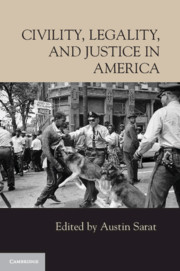2 - Civility and Formality
Published online by Cambridge University Press: 05 August 2014
Summary
Incivility is like injustice in Amartya Sen’s account: it is easier to identify clear cases of injustice than to say what justice consists in, and likewise it is easier to identify conduct as uncivil, that is, as an instance of incivility, than to say what civility actually is. Moreover, just as Sen maintained that “we can have a strong sense of injustice on many different grounds, and yet not agree on one particular ground as being the dominant reason for the diagnosis of injustice,” so equally we can identify incivility (in the words of one law review article) as “hostility, combativeness, rude behavior, insults, threats, or demeaning conduct or words,” without being able to say which of these – the rudeness, the hostility, the insults – is key to the diagnosis.
Maybe that doesn’t matter much for the codes that many jurisdictions and bar associations are having to set up to combat incivility among American attorneys. There seems no reason why such codes can’t just consist of a list of prohibitions, such as:
Never, without good cause, attribute to other counsel bad motives or improprieties.... Never engage in conduct that brings disorder or disruption to the courtroom.
Or, if they want to forsake the via negativa, they can add affirmative admonitions, such as “always uphold the dignity of the court” and “be punctual and prepared for all court appearances,” without having to prioritize the items on the list or privilege any one element as the essence of civility. And there may be philosophical reasons behind this approach. Both civility and its opposite may be family resemblance terms, which cannot be defined in terms of necessary and sufficient conditions. Some scholars have suggested that we can’t say much more about incivility than (like Justice Potter Stewart on “hard-core pornography”) we know it when we see it, though they reassure us that “there is sufficient consensus on the meaning of political incivility ... that promoting political-civility norms is reasonable and practical.”
- Type
- Chapter
- Information
- Civility, Legality, and Justice in America , pp. 46 - 68Publisher: Cambridge University PressPrint publication year: 2014
References
- 4
- Cited by

